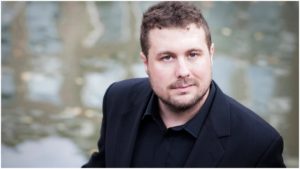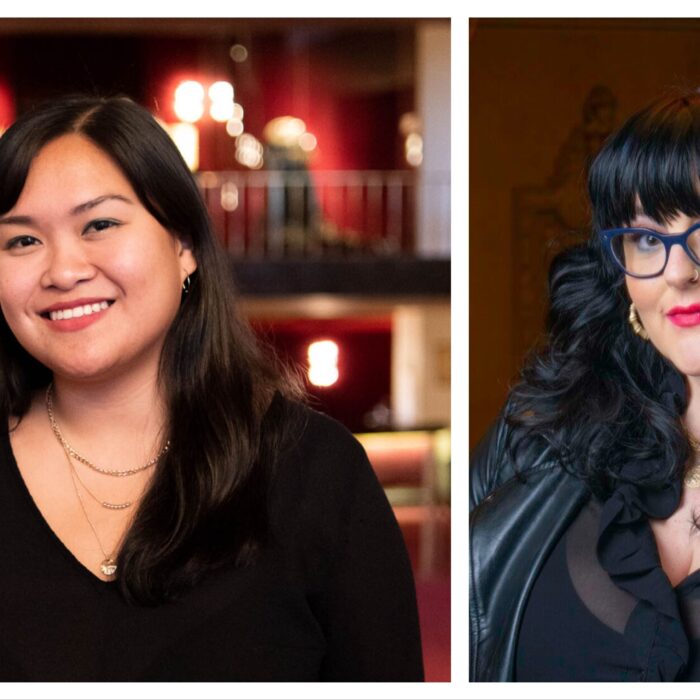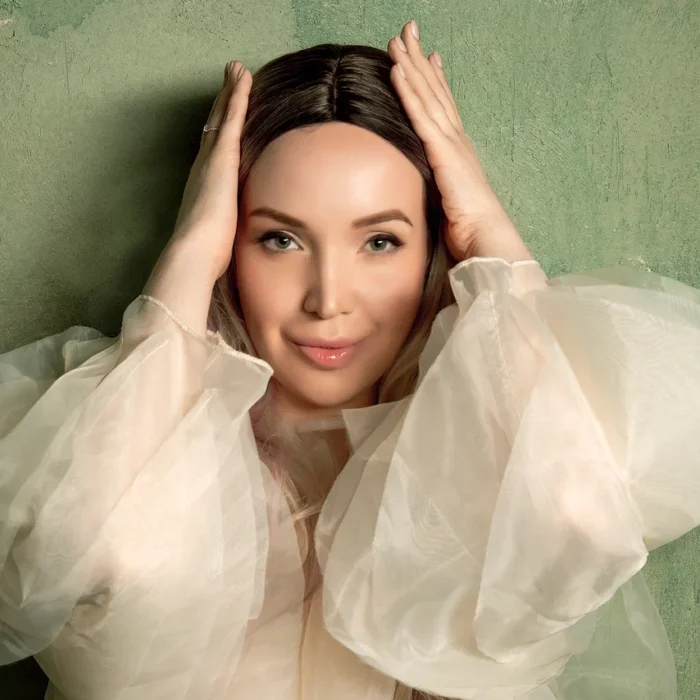
Q & A: Countertenor Alex Potter On Musicology, The Future Of Singing, British Traditions
By Ona Jarmalavičiūtė(Credit: Annelies van der Vegt)
British countertenor Alex Potter grew up in the British choral tradition as a boy chorister at Southwark Cathedral and later on sang at New College, Oxford. After this, he pursued further studies at the world-renowned Schola Cantorum in Basel, Switzerland with tenor Gerd Türk. Now he is a well-known countertenor, delighting audiences with world-class performances of seventeenth and eighteenth-century music. His repertoire varies between well-known works by Bach or Handel to those of lesser-known figures like Johann Rosenmüller and Zelenka or music by composers linked to the Habsburg Court in Vienna. He has performed with conductors including Philippe Herreweghe, Thomas Hengelbrock, Lars Ulrik Mortensen, Jordi Savall, Jos van Veldhoven, and Peter Neumann.
Alex Potter recently spoke with OperaWire contributor Ona Jarmalavičiūtė about his choice of repertoire, experiences as a performer and the search for a balance between his professional and family life.
OperaWire: You are from Great Britain and It would be very interesting to hear about your upbringing. How could you describe the British music scene and its traditions?
Alex Potter: Like many of my British colleagues, I grew up in the Anglican Choral tradition. I was a boy chorister at Southwark Cathedral and then a “choral scholar” whilst studying for a degree in Music at New College, Oxford University. Some of the colleges of the university require more time and commitment from choral scholars than others. New College of Oxford required a lot – we sang every day, went on tours and did recordings. The conductor, Edward Higginbottom, performed a large amount of baroque music with the choir, so as a young man I was very lucky to have these experiences. I was also at university to study for a degree. In the United Kingdom, there is a degree called ‘Music’, which is a mixture of a certain amount of music theory, music history, and harmony but one can also incorporate performance and other practical skills like reading from facsimile manuscripts and performance. I think on the continent, at least in Germany or Austria, there is a much bigger divide between musicology and performance. In England studying ‘music’ at university leaves open the possibility of going on to be a performer, a musicologist or even doing something completely different!
After I graduated from Oxford, I went on to further study with Gerd Türk at the Schola Cantorum in Basel. After finishing I stayed there for a few years partly because of my wife and children and also due to a network of excellent contacts. Basel also has world-class music libraries, which I still use when I am there to find repertoire for new concert programs.
So, having come from a choir tradition, at the beginning of my career I sang a lot of ensemble music with groups like Collegium Vocale Gent. Through it, I built up a network of contacts and was increasingly asked to sing as a soloist. However, my background in choirs is still vital to what I do, both because of the training and experience it provided but also because with many Ensembles like Collegium Vocale Gent or the Dutch Bach Society the soloists also sing in the choir.
OW: When you were young and starting your career, how did you imagined the profession of the early music singer?
AP: There was one thing that I thought will be different: When I was young and just about to start my career, there were many more CD recordings still being made, so I thought they would make up a much larger part of what I do. Fortunately, I didn’t really get used to this situation – some people working in the 80s and 90s were paid well for recordings for years and then, quite quickly, everything changed and people were even expected to pay to record. As one colleague put it: “suddenly the rules changed!”
OW: How do you design a solo concert?
AP: It depends really. Often the festival has a theme. Then you look for music that would fit into the theme. Sometimes it works differently. For example, this year I am singing a concert in Vancouver, Canada. They asked if I could put together a program for five singers and continuo. After some thought, I came up with the idea of a concert based on the biblical “Song of Songs.” I researched and printed out a huge pile of music with “Song of Songs” text for this combination of voices and instruments.
It was important to have enough variety but also some kind of general flow to it: The program has to have its periods of energy and calm combined in a shape which will hopefully be pleasing to the audience. It took me quite some time. I had long evenings with sheet music spread over the table as though trying to work out a puzzle. It took time to discover something that really works because there is so much wonderful music composed to “Song of Songs” texts. It is about finding and selecting pieces then putting them together to give a pleasing form to the evening.
This program also has an excellent team of soloist making up the ensemble; one also has to take into account that people come to hear them individually as soloists, so one also needs to consider what fits well to the individual singers involved. Hours of work but ultimately very rewarding.
OW: And when you make a CD recording, is it a similar process choosing what to record?
AP: Certainly for Solo CDs this is often more straight forward. For example, a few years ago I recorded a solo CD with motets by Johann Rosenmüller. There are a limited number of works by him for alto solo, so in the end I only had to decide on a couple of pieces not to include. Choosing instrumental works and then the final order of the CD, on the other hand, was extremely time-consuming.
Sometimes other factors come into play: For instance, I recently recorded a disc of Telemann Solo-Cantatas with a historical organ in Grasberg near Bremen. We were using the organ for continuo but as it is such a wonderful instrument by Arp Schnitger we felt it was only right to add some works for organ solo by Telemann. But again it has to work with the general flow of the programme.
OW: How did you decide to perform this type of early choral music?
AP: The Anglican choral tradition in which I grew up contains lots of what one might call “early music.” For some reason, even as a child, this type of music spoke to me – I had an affinity with it, much more than with the Romantic part of the repertoire.
There was just something about these earlier composers like Orlando Gibbons, or Henry Purcell, which was close to my heart. When my voice broke and I became a countertenor a few years a later, it was a perfect fit because this earlier music forms the core of the repertoire for the voice.
OW: How do you interpret this type of music? Do you have some principles that you use with each piece?
AP: Obviously, as singers we have a text. So I start with this and then always look for a meaning behind the text – historical, biographical context, etc. I like to think about what may have inspired the composers when setting these words. For example, I sing a lot of Bach Cantatas. There, of course, you have poetic Cantata texts based on the bible, but only rarely directly quoting from it – it is theological baroque poetry. These works were also part of a religious ritual. So there are many different factors that you examine: when was the Cantata written and for which feast day? What were the readings in the service on that day? To which other religious texts do the words allude? How does Bach then respond to all these elements in his settings? So all of this information impacts my interpretation of the piece.
OW: Do you have a favorite composer you enjoy performing most?
AP: Oh, difficult to say, because there are so many of them. I love performing J.S. Bach and I have become something of a specialist in his music. He really is a genius, so there is nothing wrong with having him as your favourite!
OW: Do you have any rituals as goes to the work ethic or nourishing your voice?
AP: I don’t think I have any set rituals. I find it important to be physically active on the concert day. Maybe I would just go for a walk or something similar, which helps keep me more awake. I also try to switch off my mobile phone a while before the concert and maybe read something about what I am singing or some other literature. This is good “brain food” and helps me mentally focus for the performance.
OW: As a countertenor, is there something special about the pieces that you can perform?
AP: Actually it’s mostly music from the Sixteenth until the Eighteenth Centuries. In the Twentieth Century composers started writing for countertenor again but I don’t perform that much modern music. There a number of countertenors who focus on contemporary music much more than I do but sometimes I do sing modern repertoire as well.
Recently I did a concert with wonderful music by Benjamin Britten in Vancouver. However, I do mostly sing works from the Renaissance and Baroque periods, which is fine for me for me because I love the music.
OW: Do you think there are values in you that were imprinted during your youth – maybe by studies or your professors?
AP: My mother always sang to me when I was a child. There is something about music that comes straight from my heart. Of course, when you get older and study music, you start to think about it. In my opinion, while performing music it is important to keep this connection between the head and the heart, the balance between the rational and emotional. I remember that the conductor of the New College always told us not just to “sing.”
He always asked, “Where is the intention there?” For him, you don’t play a note because it’s on the page but because it is part of delivering a message. Philippe Herreweghe also is also a great advocate of this approach and, in addition, I learned an enormous amount about the way he approaches text – especially Latin. As he frequently says, no one would sing “Im wunderschönen Monat Mai” like a robot, so we shouldn’t do it in Latin either. For Renaissance and Baroque composers it was a living language and we should approach it as such. You must try to have that same connection to the text and you have to deliver something to the audience.
OW: Could you tell more about your musicology studies?
AP: At the end of my studies at New College Oxford, we had five three-hour exams in three days. I would say that the Oxford University Final Exams are really famous for being extra stressful. Surviving them is a feat in itself! I sat two History of Music papers, an analysis exam on a String Quartet, a harmony-and-counterpoint paper where we had to compose in Palestrina style, and an optional Exam about the historical staging of opera.
As coursework we were given the beginning of a Baroque aria and had to complete it in the appropriate style. In terms of practical music-making, I did one exam which consisted of singing from copies of original Fifteenth-Century manuscripts as well a recital in which I sang works by Bach, Buxtehude and Telemann.
OW: How did your studies in musicology impact your singing?
AP: I suppose studying music at university first means that I am constantly asking questions about music: how it is structured? How does the harmony work? What is the context in which the music was written and for what occasion? All these questions have a formative effect on my interpretation of the music.
OW: Do you have some thoughts about what you would like to perform in the future?
AP: Well, I am frequently involved with thinking about different concert ideas. However, if there were one work I would love to perform at some point in the future, it would be the title role in Handel’s opera “Giulio Cesare” . I sing very little opera and am not really known on the scene, so it will probably it will never happen, but still, it is nice to dream! I also have several CDs planned in my head but need to somehow find the time and money to make them happen. Maybe I will at some point…
OW: What does your work schedule look like?
AP: I travel constantly and I find this part of my profession really “a job.” Sometimes it is hard to manage family and professional life with a schedule like this. Luckily my wife stays at home and is wonderful at keeping family life running, as well as finding the time to give private piano and singing lessons. Fortunately, as a concert singer I am rarely away from home for more than two weeks, except maybe before Christmas and Easter. There are lots of places I like being: here in Salzburg is wonderful, for instance. But in my free time, I really love to be at home with my family, cooking and sleeping in my own bed!
Of course, for a musician, travel is not leisure. Sometimes you perform every night with travel in between. The pressure in these situations is a combination of the travel and the expectation, from other people and from within myself to give the best possible performance. It doesn’t matter how tiring my day was; people have paid to come and enjoy the concert and it is my job to give the finest performance I possibly can for them.
OW: What are your thoughts about the future of vocal music?
AP: People have always sung. One of the earliest things primitive people did was sing. So I hope they will keep on singing and that technology doesn’t become dominant in a way that people will not go to hear someone singing live on stage anymore. I don’t just wish it for me professionally; I think music and singing together for pleasure is an important part of being human.
OW: Could you compare British and continental Europe music traditions?
AP: There is still a very strong tradition of singing in the liturgy in the Anglican Church. It’s not quite the same here in continental Europe. To find a church with a professional choir singing with really good musical liturgy is quite rare. What I like the most about the continental music scene is that the concert life is much more spread out. In England, things are very centralized on London. In Austria, by contrast, there is a strong musical culture Salzburg and other towns, not just the capital Vienna. In Germany, almost every town has its own opera house, choir, orchestra and some kind of independent concert life. This is a wonderful inheritance of German’s history of being made up of small states and I greatly enjoy the richness and variety it creates.
OW: What do you expect from the performance in this Salzburger Festspiele festival?
AP: There is always a special atmosphere here. This is one of the most famous classical music festivals in the world. It is a great place and I find the city very beautiful. I also love the tonight’s venue, the Kollegienkirche, both acoustically and architecturally. It is a wonderful venue for Renaissance and Baroque music. The concert consists of Lamentations by Victoria and Palestrina in the first half and then the glorious E-Minor Mass by Bruckner, who was profoundly influenced by the music of renaissanceFabulous repertoire in this amazing historical venue: a dream combination!


